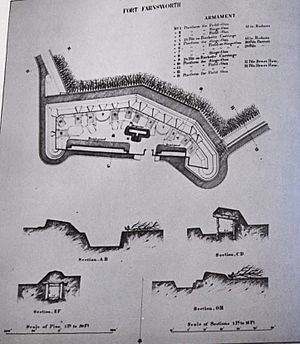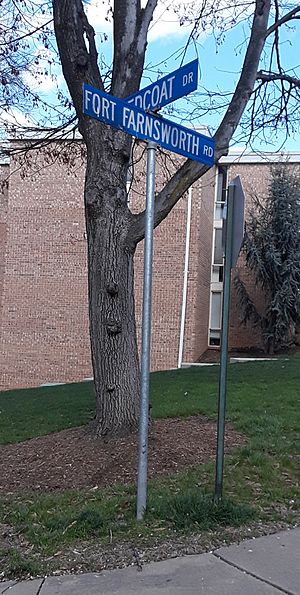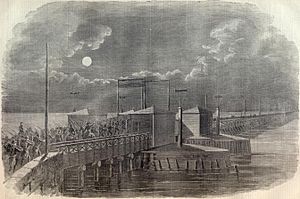Fort Farnsworth facts for kids
Quick facts for kids Fort Farnsworth |
|
|---|---|
| Part of the Civil War defenses of Washington, D.C. | |
| Fairfax County, Virginia, USA | |

Engineer plan and sections of Ft. Farnsworth
|
|
| Type | Earthwork fort |
| Site information | |
| Controlled by | Union Army |
| Site history | |
| Built | 1862–1863 |
| Built by | 34th Massachusetts Volunteer Infantry |
| In use | 1862–1865 |
| Materials | Earth, timber |
| Demolished | 1865 |
| Battles/wars | American Civil War |
Fort Farnsworth was an important fort built by the Union Army during the American Civil War. It was located in what is now the Huntington area of Fairfax County, Virginia. This fort was made of wood and earth. It helped protect Washington, D.C. from attacks from the south, near Alexandria, Virginia. Today, you won't find any parts of the old fort. The Huntington Metro station now stands where Fort Farnsworth used to be.
Why Arlington Was Occupied
Before the Civil War began, Alexandria County was mostly farmland. This area of Virginia was very close to Washington, D.C.. In 1847, this land had become part of Virginia again. Most people lived in the city of Alexandria. The rest of the county had farms and a famous house called Arlington House. This house belonged to Mary Custis, who was married to Robert E. Lee.
After Fort Sumter was attacked in April 1861, President Abraham Lincoln said there was a rebellion. He asked for 75,000 soldiers to stop it. This made many southern states angry. They quickly started talking about leaving the Union. Virginia voted to leave the Union on May 23, 1861.
The U.S. Army then created the Department of Washington. This group brought all Union soldiers in Washington, D.C., and Maryland together.
Protecting Washington, D.C.
General Joseph K. Mansfield led the Department of Washington. He believed that Northern Virginia needed to be taken over quickly. This would stop the Confederate Army from putting cannons on the hills there. These cannons could easily shoot at government buildings in Washington.
He also wanted forts built on the Virginia side of the Potomac River. These forts would protect the ends of important bridges. These bridges were the Chain Bridge, Long Bridge, and Aqueduct Bridge. His leaders agreed, but they waited until Virginia voted on secession.
On May 23, 1861, Virginia voted to leave the Union. That night, U.S. Army troops started crossing the bridges into Virginia. The New York Herald newspaper described this march. It said that many soldiers began crossing the bridges around 10 p.m.
The newspaper reported that thousands of soldiers crossed the Long Bridge. Other troops crossed the Chain Bridge. They took control of the high ground nearby.
Taking over Northern Virginia was mostly peaceful. But in Alexandria, Colonel Elmer E. Ellsworth was killed. He was trying to remove a Confederate flag from a hotel. The hotel owner shot him. Ellsworth was one of the first soldiers killed in the Civil War. Alexandria remained a Confederate stronghold. Because of this, Union soldiers had to stay there throughout the war.
Building Forts After Bull Run
For seven weeks after taking over Northern Virginia, soldiers built forts. These forts were along the Potomac River. They also protected the entrances to the three main bridges connecting Virginia to Washington and Georgetown.
While these river forts were being built, plans for a huge new ring of forts began. These new forts would protect Washington from all directions. This work stopped in mid-July because of the First Battle of Bull Run. Soldiers who were building forts went to fight instead. After the Union lost at Bull Run, people panicked. They quickly built defenses to protect Washington from a possible Confederate attack. These defenses were mostly in Arlington.
On July 26, 1861, General George B. McClellan took command of the Washington military district. He was shocked by how weak the city's defenses were. He said there were not enough forts or soldiers to stop a strong enemy attack. He also noted that no forts had been started on the Maryland side. This meant the enemy could easily shell the city.
To fix this, McClellan ordered many new forts and trenches to be built. These defenses would be strong enough to stop any attack. Alexandria was especially important. It had a large port and was the end of the Chesapeake and Ohio Canal.
 | Mary Eliza Mahoney |
 | Susie King Taylor |
 | Ida Gray |
 | Eliza Ann Grier |



